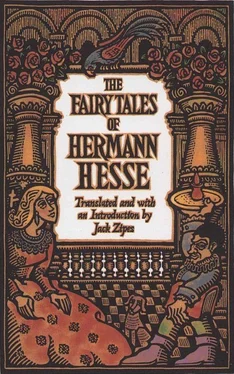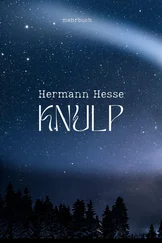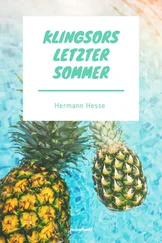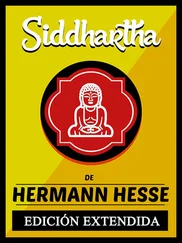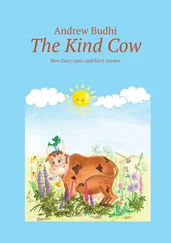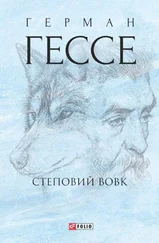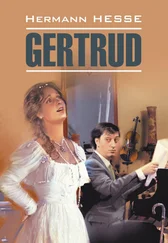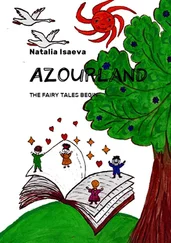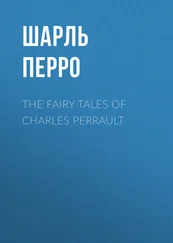Hermann Hesse - The Fairy Tales of Hermann Hesse
Здесь есть возможность читать онлайн «Hermann Hesse - The Fairy Tales of Hermann Hesse» весь текст электронной книги совершенно бесплатно (целиком полную версию без сокращений). В некоторых случаях можно слушать аудио, скачать через торрент в формате fb2 и присутствует краткое содержание. Год выпуска: 1995, ISBN: 1995, Издательство: Bantam Books, Жанр: Классическая проза, Сказка, на английском языке. Описание произведения, (предисловие) а так же отзывы посетителей доступны на портале библиотеки ЛибКат.
- Название:The Fairy Tales of Hermann Hesse
- Автор:
- Издательство:Bantam Books
- Жанр:
- Год:1995
- ISBN:9780553377767
- Рейтинг книги:5 / 5. Голосов: 1
-
Избранное:Добавить в избранное
- Отзывы:
-
Ваша оценка:
- 100
- 1
- 2
- 3
- 4
- 5
The Fairy Tales of Hermann Hesse: краткое содержание, описание и аннотация
Предлагаем к чтению аннотацию, описание, краткое содержание или предисловие (зависит от того, что написал сам автор книги «The Fairy Tales of Hermann Hesse»). Если вы не нашли необходимую информацию о книге — напишите в комментариях, мы постараемся отыскать её.
The Fairy Tales of Hermann Hesse — читать онлайн бесплатно полную книгу (весь текст) целиком
Ниже представлен текст книги, разбитый по страницам. Система сохранения места последней прочитанной страницы, позволяет с удобством читать онлайн бесплатно книгу «The Fairy Tales of Hermann Hesse», без необходимости каждый раз заново искать на чём Вы остановились. Поставьте закладку, и сможете в любой момент перейти на страницу, на которой закончили чтение.
Интервал:
Закладка:
“I understand,” I said. “It’s actually no longer astonishing. But there is something I don’t entirely understand. Tell me, why is the whole world actually exerting such tremendous energy this way? These deprivations, these laws, these offices and officials — what is it actually that people are protecting and maintaining with all of this?”
The gentleman looked at me with astonishment.
“That is some question!” he exclaimed, and shook his head. “You know, don’t you, that there is a war, war all over the world! And that’s what we are maintaining. It is war. Without these enormous efforts and accomplishments, the armies could not remain in the battlefields one week more. They would starve — they would not be able to endure.”
“Yes,” I said, “that’s certainly food for thought! So war is the good thing that is being maintained by all these sacrifices! Yes, but — permit me to ask a strange question — why do you place such high value on war? Is it really worth all this? Is war really a good thing at all?”
The official shrugged sympathetically He saw that I did not understand him.
“My dear Mr. Sinclair,” he said, “you’ve become very ignorant of the ways of the world. But please, just go through one street. Speak with the people. Just make a little effort to think and ask yourself: What else is left? What is it that constitutes our life? Then you will immediately have to say: War is the only thing that we still have! Pleasure and personal gain, social ambition, greed, love, intellectual work — all this no longer exists. War is the one and only activity for which we are grateful. It still gives us something like order, law, thought, and spirit in the world. Can you grasp this?”
Yes, now I understood, and I thanked the gentleman very much.
Then I left his room and mechanically stuck the letter of recommendation for office 127 into my pocket. I did not intend to make use of it. Nothing now was so important that I had to bother another one of those officials. And before I could be noticed again and taken to task, I spoke to the tiny blessed star within me, shut off my heartbeat, made my body disappear into the shadow of a bush, and continued my previous voyage without thinking about returning home ever again.
The European
(1918)

Finally, the Lord our God showed His consideration and brought about an end to the bloody world war on earth by sending the great flood. These tides of water mercifully cleansed the aging planet of everything that had desecrated it — the bloody fields of snow and the motionless mountains decked with cannons. They also cleared away the rotting corpses, along with those people who wept for them; the enraged and bloodthirsty individuals, along with the impoverished; the hungry, along with the mentally deranged.
The blue skies of the world now cast a friendly look at the brightly shining planet.
By the way, European technology had held its own splendidly until the very end. For weeks Europe had taken precautions and tenaciously resisted the gradually rising waters. First, it was through gigantic dams that millions of prisoners of war had built, then through artificial structures that were erected with astonishing rapidity. At the beginning they had looked like gigantic terraces, but they culminated more and more into towers. The human sense of the heroic emanated from these towers, and they stood the test with touching steadfastness until the end. While Europe and the rest of the world were swamped, the spotlights still glistened from the last of the projecting towers, dazzling and unperturbed through the damp dusk of the sinking earth, and shells soared out of the cannons, back and forth, forming elegant arches. Two days before the end, the leaders of the middle powers decided to make a peace offer to their enemies through signals of light. However, their enemies demanded the immediate evacuation of the fortified towers that were still standing, and not even the most resolute friends of peace could declare themselves ready to do that. Therefore both sides kept shooting heroically to the very last hour.
Then the entire world became submerged. The only surviving European drifted on a lifeboat in the flood and used all his energy to write down the events of the final days, so that a later humanity would know that it had been his fatherland that had outlasted its final enemies by hours and had thus secured the victory laurels for itself.
All of a sudden a ponderous vessel, black and gigantic, appeared on the gray horizon and gradually approached the exhausted man. Before he fainted, he had the satisfaction of recognizing the ancient patriarch, with his wavy silver beard, standing on board the houseboat. Then a tremendous black African fished the drifting man out of the water. He was still alive and regained consciousness. The patriarch gave him a friendly smile. His work had been successful: One type of each of the species living on earth had been saved.

While the ark sailed gently with the wind and waited for the muddy water to settle, life became merry and gay on board. Large fish followed the boat in dense schools. Birds and insects sprawled in lively, dreamlike flocks over the roof Every animal and every human rejoiced fervently at having been saved and chosen for a new life. The colorful peacock screeched its morning call shrilly and clearly over the water. The elephant laughed and sprayed a bath for himself and his wife, with his trunk raised high. The lizard sat glittering in the sunny joists. The Indian fetched sparkling fish out of the endless flood with a quick thrust of his spear. The African rubbed fire on the hearth out of dry wood and slapped his fat wife on her clapping thighs in rhythmic beats. The Hindu stood lean and stiff with folded arms and murmured ancient verses to himself from songs about the creation of the world. The Eskimo lay steaming in the sun and perspired, laughing out of small eyes, water and fat dripping from him, while a good-natured tapir sniffed him. And the small Chinaman had carved a thin stick that he carefully balanced first on his nose and then on his chin. The European used his writing materials to make an inventory of the present living creatures.
Groups and friendships were formed, and whenever a quarrel was about to erupt, the patriarch settled it with a wave of his hand. Everyone was gregarious and happy. The only one who kept to himself was the European, who occupied himself with his writing.
Soon the multicolored people and animals thought up a new kind of game or tournament in which they would compete and demonstrate their abilities and talents. Each one wanted to be first, and the patriarch had to arrange everything. He separated the large and small animals, and then he set apart the people, and they all had to register and name the feat that they thought they could best accomplish. Then each one took a turn.
This splendid tournament lasted many days since each group would frequently interrupt its game and run off to watch another group. And every marvelous performance was loudly applauded by the spectators. How many wonderful things there were to see! All of God’s creatures displayed their latent talents. The richness of life revealed itself. How they laughed, applauded, crowed, clapped, stamped, and neighed!
The weasel ran wonderfully, and the lark sang enchantingly. The puffed-up turkey marched splendidly, while the squirrel was incredibly nimble in climbing. The mandrill imitated the Malayan, and the baboon, the mandrill. Runners and climbers, swimmers and pilots competed tirelessly, and they were all unbeatable in their way and were given due recognition. There were animals that employed magic to perform wonders, and animals that could make themselves invisible. Many distinguished themselves through their strength; many through cunning; many through attack; many through defense. Insects could protect themselves by looking like grass, wood, moss, or stone, and others among the weak drew applause and caused the laughing spectators to flee horrible odors. Nobody was left out. Nobody was without talent. Birds’ nests were woven, pasted, entwined, walled up. Predatory birds could detect the tiniest thing from scary heights.
Читать дальшеИнтервал:
Закладка:
Похожие книги на «The Fairy Tales of Hermann Hesse»
Представляем Вашему вниманию похожие книги на «The Fairy Tales of Hermann Hesse» списком для выбора. Мы отобрали схожую по названию и смыслу литературу в надежде предоставить читателям больше вариантов отыскать новые, интересные, ещё непрочитанные произведения.
Обсуждение, отзывы о книге «The Fairy Tales of Hermann Hesse» и просто собственные мнения читателей. Оставьте ваши комментарии, напишите, что Вы думаете о произведении, его смысле или главных героях. Укажите что конкретно понравилось, а что нет, и почему Вы так считаете.
